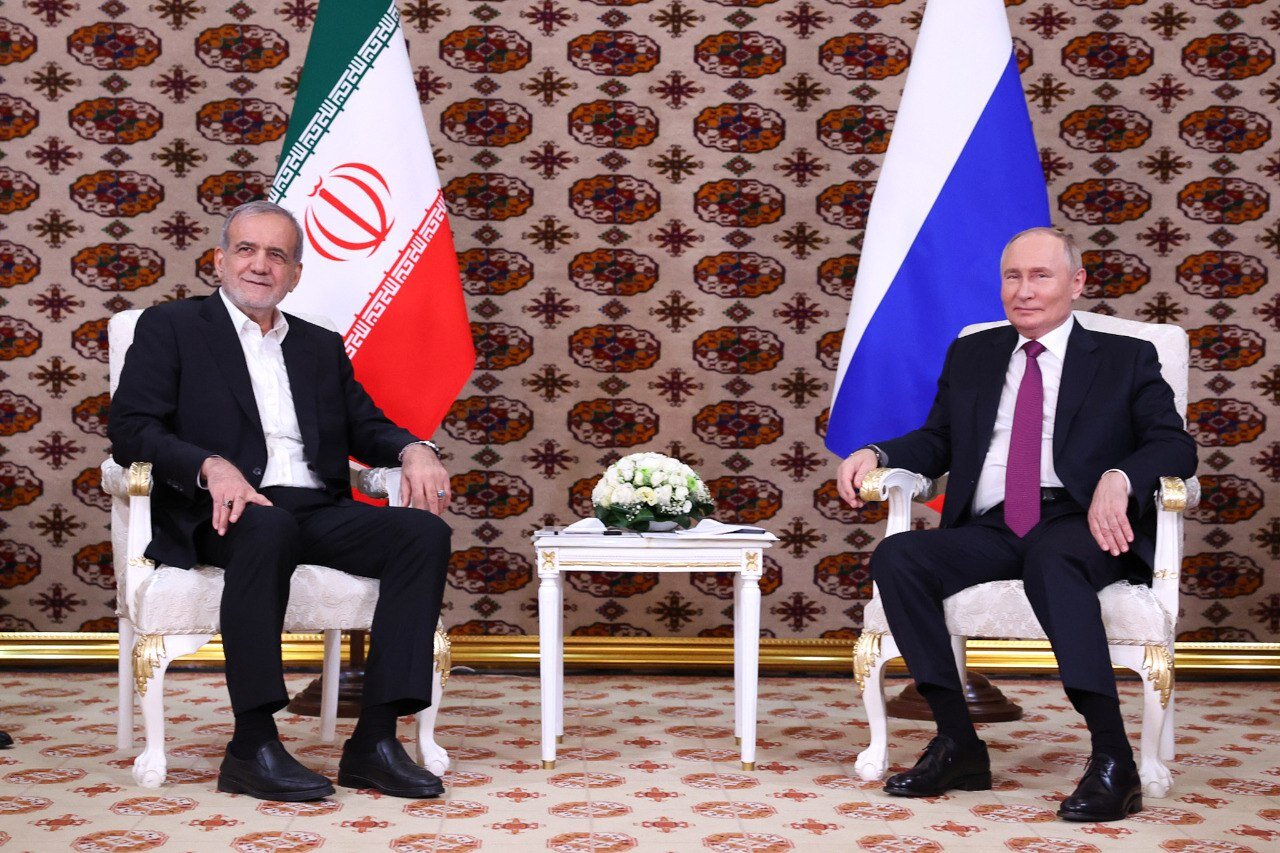‘Sincere and Strategic’
Iranian president highlights bilateral ties with Russia in meeting with Putin

TEHRAN – Iranian President Masoud Pezeshkian stressed the importance of strengthening cooperation between Iran and Russia, describing the relationship between the two nations as "sincere and strategic."
The two presidents met on the sidelines of a forum in Turkmenistan’s capital of Ashgabat on Friday. The event, organized to commemorate the 300th anniversary of the celebrated Turkmen poet Magtymguly Pyragy, provided an opportunity for the Iranian president to discuss key issues with his Russian counterpart.
Pezeshkian underscored the need to develop joint efforts across various sectors to enhance their partnership.
He noted that Iran and Russia are aligned on many global issues, stating, "Our positions on global matters are much closer to each other than to those of many other countries."
The Iranian president also expressed optimism about finalizing a strategic partnership agreement with Russia in the near future, stressing that this partnership would pave the way for deeper bilateral cooperation.
‘U.S., European countries fuel instability in the region’
Addressing regional concerns, Pezeshkian condemned Israel for its blatant disregard for international human rights standards.
He criticized the actions of the U.S. and European countries, stating that they are currently fostering instability in the region. "They do not want peaceful relations to continue between regional countries," he said, highlighting the critical situation in West Asia.
For his part, Russian President Putin welcomed the deepening of ties, reaffirming Moscow’s commitment to enhancing trade and cooperation with Iran. Putin invited Pezeshkian to attend the upcoming BRICS summit, where both leaders would engage in further discussions on mutual interests.
The president further noted that unity on a global scale is crucial to resisting extremism and violence.
‘Not only neighbors but also kin’
Following his meeting with Putin, Pezeshkian’s diplomatic efforts continued in Turkmenistan, where he held talks with the country's president, Serdar Berdimuhamedow.
During their discussions, the Iranian president reiterated Tehran’s longstanding policy of fostering strong relationships with its neighbors, a principle emphasized by Leader of the Islamic Revolution Ayatollah Seyyed Ali Khamenei.
Pezeshkian stressed the cultural and historical ties that bind Iran and Turkmenistan, referring to their shared border and close historical bonds. “We are not only neighbors but kin as well,” he noted. He underscored the necessity for peace and fraternity in the region, urging regional countries to enhance cooperation and live harmoniously.
For his part, President Berdimuhamedow expressed his gratitude for Pezeshkian's participation in the commemoration and praised his speech as profound and thoughtful.
Later in the day, Pezeshkian also met with Gurbanguly Berdimuhamedow, the chairman of the People's Council of Turkmenistan, where the two discussed enhancing cooperation in various sectors.
Pezeshkian described the 300th-anniversary celebrations as a unifying effort, saying that the poet’s message of brotherhood, unity, and cohesion resonated deeply with the spirit of the region. “Magtymguly Pyragy’s poetry embodies the lofty ideals of unity and fraternity,” Pezeshkian remarked.
Gurbanguly Berdimuhamedow reciprocated Pezeshkian’s sentiments, expressing his desire to deepen ties with Iran, particularly in the areas of culture and economy.
Gurbanguly Berdimuhamedow also pointed out the positive outcomes of the Joint Cooperation Commission between the two countries, which has been actively working to strengthen economic and political cooperation. He expressed hope that these efforts would soon yield tangible results in enhancing economic ties between Iran and Turkmenistan.
Iran, Uzbekistan discuss expansion of scientific and economic cooperation
In another notable meeting, Pezeshkian held talks with Uzbek President Shavkat Mirziyoyev. Both leaders discussed the importance of economic collaboration and the need for a joint commission to address bilateral issues.
Pezeshkian invited Mirziyoyev to visit Tehran, emphasizing Iran's readiness to expand cooperation in fields such as science, industry, and culture.
“The scientific and industrial capacities of Iran can serve as the cornerstone for our joint ventures,” Pezeshkian stated.
Mirziyoyev welcomed the proposal, acknowledging Iran's significant contributions to science and technology. He expressed Uzbekistan’s interest in benefiting from Iran’s expertise and called for establishing a joint commission as soon as possible to accelerate cooperation.
Pezeshkian’s visit to Turkmenistan is the fourth stop on his foreign tour, which follows trips to Iraq, the United Nations, and Qatar. His visit underscores the significance of Turkmenistan in Iran’s foreign policy, particularly in political, security, and geo-economic relations.
In remarks before his departure, Pezeshkian highlighted the strong and peaceful border shared by Iran and Turkmenistan, as well as the importance of the International North-South Transport Corridor (INSTC), a strategic trade route that spans from India through Iran to Central Asia and Europe. He emphasized that the INSTC would significantly benefit both Iran and Turkmenistan.
On his Turkmenistan trip, Pezeshkian was accompanied by Foreign Minister Abbas Araghchi and Culture Minister Abbas Salehi. He underscored the importance of the visit for Iran’s diplomatic and cultural ties with its Central Asian neighbor.
